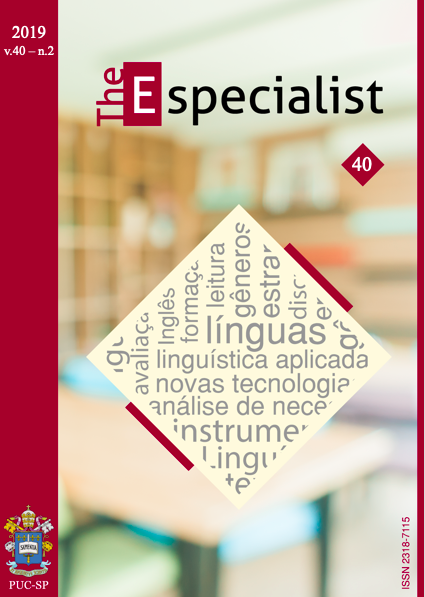Inglês como língua franca: explicações e implicações
DOI:
https://doi.org/10.23925/2318-7115.2019v40i2a2Palavras-chave:
Inglês, Língua Franca, Ensino, AprendizagemResumo
O Inglês como Língua Franca (ILF) tem como foco a comunicação em diferentes contextos e é um campo de pesquisa que nos ajuda a refletir sobre a posição que a língua inglesa ocupa no globo e como nós, do círculo em expansão (KACHRU, 1982, 1992), devemos nos posicionar em relação a ela. Nosso objetivo aqui refletir, com base em uma pesquisa bibliográfica e qualitativa, sobre a Língua Franca, o conceito, seu surgimento e as implicações no ensino e na aprendizagem da língua inglesa, com base em estudiosos da área. Concluímos, pois, que o ILF nos traz uma pedagogia que pressupõe uma prática preocupada em se reposicionar diante de visões monolíticas e monológicas e, assim sendo, a língua inglesa passa a ter identidades multiculturais e características locais, propondo um movimento de ruptura diante de um discurso de língua que perpetue desigualdades.
Referências
BAUMGARDNER, R. J. 2006. Teaching world Englishes. In: KACHRU, Braj et al. (Org.) The handbook of World Englishes. Oxford: Blackwell Publishing. pp. 661-679.
BRASIL. 2018. Ministério da Educação. Base Nacional Comum Curricular. Brasília: MEC.
BYRAM, M; HU, A. (Ed.). 2013. Routledge Encyclopedia of Language teaching and learning. 2a. ed. London: Routledge.
CANAGARAJAH, S. 2013. Translingual practice: global Englishes and Cosmopolitan relations. New York, NY: Routledge.
COGO, A. 2015. English as a Lingua Franca: Descriptions, Domains and Applications. In: BOWLES, H.; COGO, A. 2015. International perspectives on English as a lingua franca: pedagogical insights. London: Macmillan.
COGO, A.; PITZL, M. L. 2014. ELF Ren. ELF, [S.l.]. Disponível em: http://www.english-lingua-franca.org/about/elf-ren. Acesso em: 25 jun. 2017.
CRYSTAL, D. 2003. English as a global language. New York: Cambridge University Press.
CRYSTAL, D. 2008. Two thousand million? English Today, [S.l.], 24.1: 3-6.
EL KADRI, M. 2010. Inglês como língua franca: um olhar sobre programas disciplinare de um curso de formação inicial de professores de inglês. Entretextos, Londrina, 10.2: 64-91.
FIELD, J. 2003. The fuzzy notion of ‘intelligibility’: a headache for pronunciation teachers and oral testers. IATEFL Special Interest Groups Newsletter.
FIELD, J. 2005. Intelligibility and the listener: the role of lexical stress. TESOL Quarterly, 39: 399-423.
FRIEDRICH, P.; MATSUDA, A. 2010. When Five Words Are Not Enough: a conceptual and terminological discussion of English as a lingua franca. International Multilingual Research Journal, v. 4, n. 1, p. 20-30.
GIMENEZ, T. 2015. et al. Inglês como língua franca: desenvolvimentos recentes. RBLA, 15.3: 593-619. Belo Horizonte.
GRABE, William. 2010. Applied Linguistics: a twenty-first-century discipline. In: KAPLAN, R. B. 2010. The Oxford Handbook of Applied Linguistics. 2a. ed. Oxford University Press.
JENKINS, J. 1998. Which pronunciation norms and model for English as an International Language. ELT journal, 52.2: 119-126. Oxford University Press
JENKINS, J. 2000. The Phonology of English as an International Language. Oxford: Oxford University Press.
JENKINS, J. 2009. English as a lingua franca: interpretations and attitudes. World Englishes, 28.2: 200–207.
JENKINS, J. 2015. Repositioning English and multilingualism in English as a Lingua Franca. Englishes in Practice, 2.3:49-85.
JENKINS, J. 2016a. Review of International Perspectives on English as a Lingua Franca: pedagogical insights, by H. Bowles and A. Cogo (Ed.). ELT Journal, pp. 1-16.
JENKINS, J. 2016b. An introduction to English as a Lingua Franca: ELFpron speaks to Professor Jennifer Jenkins. 6’16”. Youtube, [S.l.], 20 dez 2016. Disponível em: https://www.youtube.com/watch?v=ZvWCqvxK9Hg. Acesso em: 19 abr. 2018.
JENKINS, J.; COGO, A.; DEWEY, M. 2011. Review of developments in research into English as a lingua franca. Language Teaching, 44.3: 281-315. Cambridge University Press.
KACHRU, B. B. (Ed.). 1982. The other tongue: English across cultures. Urbana, IL: University of Illinois Press,
KACHRU, B. B. 1992. World Englishes: Approaches, issues and resources. Language Teaching, 25: 1-14. [S.l.].
LEFFA, V. J. 2002. Teaching English as a multinational language. The Linguistic Association of Korea Journal, 10.1: 29-53. Seoul, Korea.
MEIERKORD, C. 2013. English as a Lingua Franca. In: CHAPELLE, C. A. (Ed.). 2013. The encyclopedia of Applied Linguistics. Blackwell Publishing Ltd.
RAJAGOPALAN, K. 2003. Por uma linguística crítica: linguagem, identidade e a questão ética. São Paulo: Parábola Editorial.
ROCHA, C. H.; MACIEL, R. F. 2015. Ensino de língua estrangeira como prática translíngue: articulações com teorizações bakhtiniana. D.E.L.T.A., 31.2: 411-445. São Paulo.
SARWAL, A. 2007. Principles and methodologies of a global language teaching program – a proposal. In: KASSABGY, N.; ELSHIMI, A. 2007. Sustaining Excellence in ‘communication across the Curriculum’: Cross-Institutional Experiences and Best Practises. UK: Cambridge Scholars Publising. pp. 128-146.
SCHUMACHER, C.; WHITE, P.; ZANETTINI, M. 2002. Guia de pronúncia do inglês para brasileiros: soluções práticas para falar com clareza. Rio de Janeiro: Campus.
SEIDLHOFER, B. 2001. Closing a conceptual gap: the case for a description of English as a Lingua Franca. International Journal of Applied Linguistics, 11.2: 133-158.
SEIDLHOFER, B. 2004. Research perspectives on teaching English as a lingua franca. Annual Review of Applied Linguistics, 24: 209–239. USA, Cambridge: Cambridge University Press.
SEIDLHOFER, B. 2005. English as a lingua franca. ELT Journal, 59.4: 339-341. Oxford University Press.
SEIDLHOFER, B. 2011. Understanding English as a Lingua Franca. Oxford: Oxford University Press.
SMITH, L. E. 1992. Spread of English and issues of intelligibility. In: KACHRU, B. B. (Ed.). 1992. The other tongue: English across cultures Urbana: University of Illinois Press. pp. 27-47.
TIMMIS, I. 2002. Native-speaker norms and International English: a classroom view. ELT Journal, 56.3: 240-249. Oxford University Press.
UNESCO. 1953. The use of vernacular languages in education. Monographs on fundamental education – VIII. Paris: UNESCO.
Downloads
Publicado
Como Citar
Edição
Seção
Licença
Os autores concedem à revista todos os direitos autorais referentes aos trabalhos publicados. Os conceitos emitidos em artigos assinados são de absoluta e exclusiva responsabilidade de seus autores.


 Esta obra está licenciada com uma Licença
Esta obra está licenciada com uma Licença 

